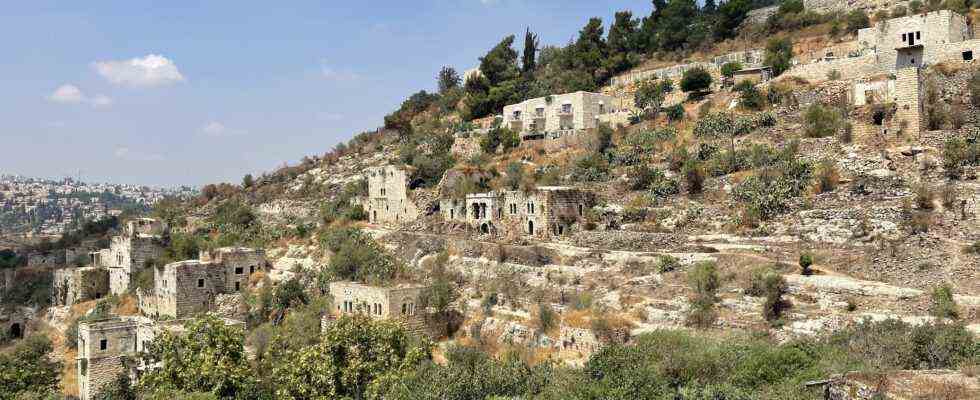Status: 08/01/2021 4:02 a.m.
New zoning plans keep causing violent clashes between Jewish and Palestinian Israelis. Now the land authorities want to cultivate the abandoned village of Lifta near Jerusalem.
Yacoub Odeh stands on the edge of the valley and has his cell phone camera pointed at him. The 81-year-old Palestinian takes a selfie of himself and the remains of his house. It was three stories, two of which collapsed. He and his father were born in this house, he reports and states: “It’s a miserable life to only be able to take photos of your own house, but not to live in it.”
Odeh is one of the last living “Liftawis”: residents of the Palestinian village of Lifta. During the Israeli War of Independence in 1947/48, the residents fled or were expelled. Around 400 houses once stood here in Lifta. Today there are still 50. Large windows and balconies show that Lifta was a very wealthy village.
Odeh was eight years old when he had to leave this village, but he remembers family life in the house, says that he can still smell the smell of home-baked bread – they were like kings in the village back then.
Yacoub Odeh knows that he will not return to Lifta. But he doesn’t want the place to be rebuilt.
Lifta is a beautiful place: for centuries the village has been located at the western entrance to Jerusalem in a valley with steep slopes. The highway to Tel Aviv runs above. The houses are made of light, yellowish stones. Lifta is unique in the region: a larger empty Palestinian village that is still standing. In some places it looks as if the residents only left it yesterday. In other places, shrubs, grasses and cacti now dominate.
Rare vacancy – still
According to the United Nations, around 1948 700,000 Palestinians had to flee or were driven out by Israeli forces. Odeh now lives in an apartment building in East Jerusalem. He knows the chances are slim that he will be able to return to Lifta. He accepts that.
What he does not want to accept are the plans of the Israeli land authority. According to the Israeli media, she wants to tender a project for Lifta these days: around 250 buildings are to be built, including villas, hotels, restaurants and streets. That, says Odeh, is like trying to erase their history – nobody has the right to do that.
The ruins of the houses in Lifta suggest that the place was once worth living in – and wealthy.
A request to the Israeli land authorities went unanswered. However, the authority defends its plans to the Israeli media: it is dangerous for visitors to enter Lifta. The buildings are in danger of collapsing. Their maintenance can only be financed as part of a project for new houses and hotels.
There is already a hotel
The Lifta Boutique Hotel is located in the upper part of the valley. What is called lounge music comes from small speakers. Six suites, a pool and a sauna. Plus a spectacular view of the village. One night here costs around 900 euros per double room.
The hotel is owned by Yoni Yochanan, a Jewish Israeli. Odeh calls Yochanan a thief. He knows the original Palestinian owners of the building. The Israeli Yochanan rejects the allegation. He too comes from a family that had to flee. He understood the pain of the people who had to leave Lifta – after all, he also understood the pain of his parents who had to leave everything behind in Kurdistan. In 1951 they came here and were resettled. “For me, Lifta is childhood and everything,” says Yochanan.
The magic of seclusion
Yochanan was also born in Lifta, he too lost his house, which had to give way to a street. The Israeli then bought another building in Lifta from a foundation and opened the hotel.
Under Israeli law, Palestinian refugees who left their homes forfeited all claims. Yochanan sees it no longer turning back time. But he is in favor of Palestinians like Odeh receiving compensation from the state. But he also rejects the Israeli authorities’ plan to build on the whole of Lifta. The magic of the place will evaporate if there is a road network and car traffic. “And what for? For 200 residential units? These houses go to the rich and history disappears for them.”
Yoni Yochanan is for compensation for the displaced Palestinians – but Lifta should stay as it is today.
City versus authority
And Lifta’s story goes back a long way. At the time of the Second Jewish Temple, Jews probably lived here, later Crusaders, Ottomans and Palestinians. The village stands for flight, displacement and wars.
But it also stands for a possible unity of Arabs and Jews. Some of them have been involved in “Save Lifta” for years. The organization helped ensure that UNESCO put Lifta on a list of possible world cultural heritage sites. This legacy of all people, says the Jewish Israeli and historian Ilan Shtayer, is yet another argument to take a closer look at this place.
It currently seems possible that at least the city of Jerusalem will partially follow these arguments. So far, it does not support the plans of the Israeli land authority. The unique Lifta could be kept in its current form.

